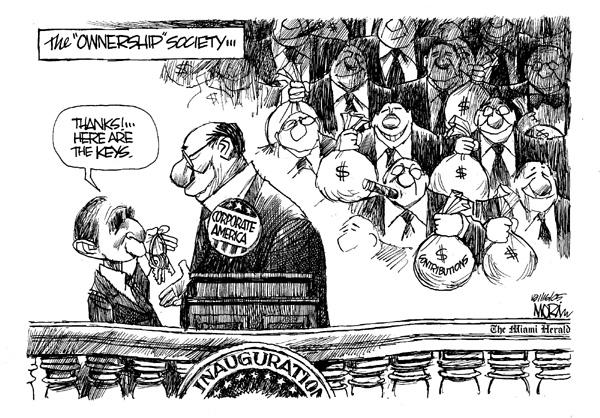Dean Shareski over at Ideas and Thoughts of an Ed Tech wrote a thoughtful response to Time Magazine's article about Michelle Rhee today. The following are the comments I added to his post:

I think @wmchamberlain is on the right track by stating that the problem lies in our lack of a concrete purpose for schools. However, our lack of a concrete purpose I think is the result of a larger problem for which the problems in our school systems are a direct result. The problem lies more in what driving forces our human race has allowed to guide everything from our structures of governance to our schools, to how we fulfill our material needs. This problem has its roots far back in our history to the invention of money for trading goods and services. Where at first benign, this tool has allowed the worst of human traits to inform and direct nearly every aspect of how people relate to one another, how we treat our environment, and what we value. For money to work we have to have a fundamentally universal understanding of the definition and concept of ownership. More specifically, things become possessions. Possessions can be traded. A variable can be assigned to hold the value of said possessions. Thereby laying the foundation for our economic system. A system that can be taken advantage of. An abstract system based on the abstract concept of ownership. When that system crashes as it has recently we don’t see material disappear, we have not really lost anything real. What we loose is the illusion we have created by investing in abstract concepts such as ownership and money.
Ownership has had different meanings historically by different cultures. Traditional American Indian cultures had a very different understanding of ownership than feudal systems that emerged in Europe or even Eastern cultures such as emerged in Tibet or Bhutan. Under feudal systems the concept of ownership was less abstract but was the foundation for it’s existence. The monarchy owns everything. The populous is granted by the monarchy permission to use their goods. As cultures
indoctrinated under feudal systems evolved and systems of government changed the concept of ownership remained. These cultures later spread their view of ownership across the world through colonization, enslavement, genocide, and more recently commercialization. This understanding of and value for the concept of ownership and the evolved need for our species to hold on to this abstract notion has spread throughout the whole world. Cultures who have a different concept of or no concept of ownership at all are either looked at as primitive or are forced to comply and reform. Not to do so often results in the loss of basic needs, imprisonment, or even torture.
Ownership is control. Our economy dictates who has this control. Our governments are chiefly concerned with the economy. Our governments mandate standardized testing in math so members of our society can participate in this economy and understand their place. Our governments mandate standardized testing in reading so members of our society can communicate well enough to help drive this economic engine by producing goods and trading them with each other. All traditional reasons given for what schools are for all equate to the same thing: Schools exist to reinforce the concept of ownership and produce adults devoted to this notion thereby maintaining structures of control.
We are starting to see the flaws inherent in basing our society on the concept of ownership unravel. Ownership begets greed and greed begets lust, gluttony, and envy. Greed and gluttony have resulted in the decline in our environment that if left unchecked will
ultimately result in our own extinction. This ownership society has also resulted in the diminished quality of life for most people living in third world nations and many of the poor living in our industrialized nations. This includes the “at risk” students in our schools whose basic needs are not met.
Now, we have collectively developed some concepts that run counter to the idea of ownership and have thus thrown a wrench in the ownership control system. Those include the Bill of Rights which includes freedom of speech. Based in our right to free speech the recent open source movement has brought the concept of ownership into question. Creative Commons also throws a wrench in this ownership idea as do socialized medicine and universal health care.
Our failing schools are a result of the collapse of the ownership doctrine. Standardized tests test a student’s ability to thrive and participate in an ownership society. What subjects of study would we value more if we eliminated our current concept of ownership? What would our world look like if ownership did not reign supreme. Those teachers, administrators, and politicians who support standardized testing, teach to the test, and use standardized tests in math and reading to measure the success of a school are agents of the ownership society. They are agents of a social system that has historically included slavery, genocide, torture, and greed.











No comments:
Post a Comment